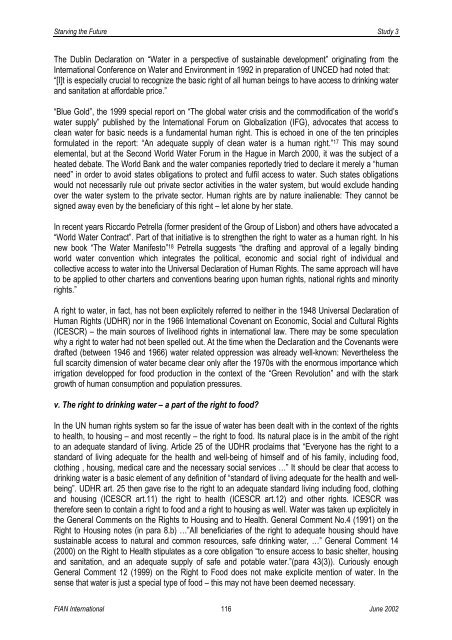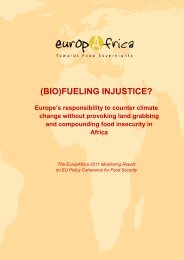Study 3: Ecodestruction and the Right to Food: The Cases of Water ...
Study 3: Ecodestruction and the Right to Food: The Cases of Water ...
Study 3: Ecodestruction and the Right to Food: The Cases of Water ...
You also want an ePaper? Increase the reach of your titles
YUMPU automatically turns print PDFs into web optimized ePapers that Google loves.
Starving <strong>the</strong> Future <strong>Study</strong> 3<br />
<strong>The</strong> Dublin Declaration on “<strong>Water</strong> in a perspective <strong>of</strong> sustainable development” originating from <strong>the</strong><br />
International Conference on <strong>Water</strong> <strong>and</strong> Environment in 1992 in preparation <strong>of</strong> UNCED had noted that:<br />
“[I]t is especially crucial <strong>to</strong> recognize <strong>the</strong> basic right <strong>of</strong> all human beings <strong>to</strong> have access <strong>to</strong> drinking water<br />
<strong>and</strong> sanitation at affordable price.”<br />
“Blue Gold”, <strong>the</strong> 1999 special report on “<strong>The</strong> global water crisis <strong>and</strong> <strong>the</strong> commodification <strong>of</strong> <strong>the</strong> world’s<br />
water supply” published by <strong>the</strong> International Forum on Globalization (IFG), advocates that access <strong>to</strong><br />
clean water for basic needs is a fundamental human right. This is echoed in one <strong>of</strong> <strong>the</strong> ten principles<br />
formulated in <strong>the</strong> report: “An adequate supply <strong>of</strong> clean water is a human right.” 17 This may sound<br />
elemental, but at <strong>the</strong> Second World <strong>Water</strong> Forum in <strong>the</strong> Hague in March 2000, it was <strong>the</strong> subject <strong>of</strong> a<br />
heated debate. <strong>The</strong> World Bank <strong>and</strong> <strong>the</strong> water companies reportedly tried <strong>to</strong> declare it merely a “human<br />
need” in order <strong>to</strong> avoid states obligations <strong>to</strong> protect <strong>and</strong> fulfil access <strong>to</strong> water. Such states obligations<br />
would not necessarily rule out private sec<strong>to</strong>r activities in <strong>the</strong> water system, but would exclude h<strong>and</strong>ing<br />
over <strong>the</strong> water system <strong>to</strong> <strong>the</strong> private sec<strong>to</strong>r. Human rights are by nature inalienable: <strong>The</strong>y cannot be<br />
signed away even by <strong>the</strong> beneficiary <strong>of</strong> this right – let alone by her state.<br />
In recent years Riccardo Petrella (former president <strong>of</strong> <strong>the</strong> Group <strong>of</strong> Lisbon) <strong>and</strong> o<strong>the</strong>rs have advocated a<br />
“World <strong>Water</strong> Contract”. Part <strong>of</strong> that initiative is <strong>to</strong> streng<strong>the</strong>n <strong>the</strong> right <strong>to</strong> water as a human right. In his<br />
new book “<strong>The</strong> <strong>Water</strong> Manifes<strong>to</strong>” 18 Petrella suggests “<strong>the</strong> drafting <strong>and</strong> approval <strong>of</strong> a legally binding<br />
world water convention which integrates <strong>the</strong> political, economic <strong>and</strong> social right <strong>of</strong> individual <strong>and</strong><br />
collective access <strong>to</strong> water in<strong>to</strong> <strong>the</strong> Universal Declaration <strong>of</strong> Human <strong>Right</strong>s. <strong>The</strong> same approach will have<br />
<strong>to</strong> be applied <strong>to</strong> o<strong>the</strong>r charters <strong>and</strong> conventions bearing upon human rights, national rights <strong>and</strong> minority<br />
rights.”<br />
A right <strong>to</strong> water, in fact, has not been explicitely referred <strong>to</strong> nei<strong>the</strong>r in <strong>the</strong> 1948 Universal Declaration <strong>of</strong><br />
Human <strong>Right</strong>s (UDHR) nor in <strong>the</strong> 1966 International Covenant on Economic, Social <strong>and</strong> Cultural <strong>Right</strong>s<br />
(ICESCR) – <strong>the</strong> main sources <strong>of</strong> livelihood rights in international law. <strong>The</strong>re may be some speculation<br />
why a right <strong>to</strong> water had not been spelled out. At <strong>the</strong> time when <strong>the</strong> Declaration <strong>and</strong> <strong>the</strong> Covenants were<br />
drafted (between 1946 <strong>and</strong> 1966) water related oppression was already well-known: Never<strong>the</strong>less <strong>the</strong><br />
full scarcity dimension <strong>of</strong> water became clear only after <strong>the</strong> 1970s with <strong>the</strong> enormous importance which<br />
irrigation developped for food production in <strong>the</strong> context <strong>of</strong> <strong>the</strong> “Green Revolution” <strong>and</strong> with <strong>the</strong> stark<br />
growth <strong>of</strong> human consumption <strong>and</strong> population pressures.<br />
v. <strong>The</strong> right <strong>to</strong> drinking water – a part <strong>of</strong> <strong>the</strong> right <strong>to</strong> food?<br />
In <strong>the</strong> UN human rights system so far <strong>the</strong> issue <strong>of</strong> water has been dealt with in <strong>the</strong> context <strong>of</strong> <strong>the</strong> rights<br />
<strong>to</strong> health, <strong>to</strong> housing – <strong>and</strong> most recently – <strong>the</strong> right <strong>to</strong> food. Its natural place is in <strong>the</strong> ambit <strong>of</strong> <strong>the</strong> right<br />
<strong>to</strong> an adequate st<strong>and</strong>ard <strong>of</strong> living. Article 25 <strong>of</strong> <strong>the</strong> UDHR proclaims that “Everyone has <strong>the</strong> right <strong>to</strong> a<br />
st<strong>and</strong>ard <strong>of</strong> living adequate for <strong>the</strong> health <strong>and</strong> well-being <strong>of</strong> himself <strong>and</strong> <strong>of</strong> his family, including food,<br />
clothing , housing, medical care <strong>and</strong> <strong>the</strong> necessary social services …” It should be clear that access <strong>to</strong><br />
drinking water is a basic element <strong>of</strong> any definition <strong>of</strong> “st<strong>and</strong>ard <strong>of</strong> living adequate for <strong>the</strong> health <strong>and</strong> wellbeing”.<br />
UDHR art. 25 <strong>the</strong>n gave rise <strong>to</strong> <strong>the</strong> right <strong>to</strong> an adequate st<strong>and</strong>ard living including food, clothing<br />
<strong>and</strong> housing (ICESCR art.11) <strong>the</strong> right <strong>to</strong> health (ICESCR art.12) <strong>and</strong> o<strong>the</strong>r rights. ICESCR was<br />
<strong>the</strong>refore seen <strong>to</strong> contain a right <strong>to</strong> food <strong>and</strong> a right <strong>to</strong> housing as well. <strong>Water</strong> was taken up explicitely in<br />
<strong>the</strong> General Comments on <strong>the</strong> <strong>Right</strong>s <strong>to</strong> Housing <strong>and</strong> <strong>to</strong> Health. General Comment No.4 (1991) on <strong>the</strong><br />
<strong>Right</strong> <strong>to</strong> Housing notes (in para 8.b) …”All beneficiaries <strong>of</strong> <strong>the</strong> right <strong>to</strong> adequate housing should have<br />
sustainable access <strong>to</strong> natural <strong>and</strong> common resources, safe drinking water, …” General Comment 14<br />
(2000) on <strong>the</strong> <strong>Right</strong> <strong>to</strong> Health stipulates as a core obligation “<strong>to</strong> ensure access <strong>to</strong> basic shelter, housing<br />
<strong>and</strong> sanitation, <strong>and</strong> an adequate supply <strong>of</strong> safe <strong>and</strong> potable water.”(para 43(3)). Curiously enough<br />
General Comment 12 (1999) on <strong>the</strong> <strong>Right</strong> <strong>to</strong> <strong>Food</strong> does not make explicite mention <strong>of</strong> water. In <strong>the</strong><br />
sense that water is just a special type <strong>of</strong> food – this may not have been deemed necessary.<br />
FIAN International 116<br />
June 2002
















